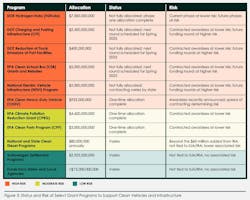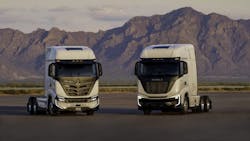Clean transportation adoption today: Renewable fuels up, ZEVs down
ANAHEIM, California—Clean transportation technologies are in choppy waters. TRC Companies released its sixth annual State of Sustainable Fleets Market Brief today at the Advanced Clean Transportation Expo here. The report outlines the major changes for clean transportation regulation, market development, and technology.
Clean transportation technologies are in choppy waters. Several competing technologies and businesses are finding their niches across the truckload, transit, municipal, and drayage sectors—while many other businesses are going bankrupt.
“These are all signs of an industry in transformation,” the report’s authors said. They emphasized that an overall growth in supply and demand “underscores the industry’s resilience and adaptability in the face of shifting regulatory, economic, and technological factors.”
See also: Driving an electric cargo van vs. ICE cargo van
From over 100 pages of key data representing the current sustainable transportation landscape, here are some of the top advancements and challenges for alternative fuels.
Government incentives
The nation’s transportation policy is changing quickly, leaving an uncertain future for alternative fuels. The new Trump administration wants to roll back many environmental policies, including clean transportation incentives, emissions standards, and California Air Resources Board waivers.
Executive orders pushed the Environmental Protection Agency to reconsider all greenhouse gas regulations and paused funding disbursements for alternative fuels. EPA later announced that it is reconsidering all its greenhouse gas regulations, including those affecting heavy-duty vehicles such as GHG3. The Supreme Court’s 2024 reversal of Chevron deference also weakened EPA’s existing regulatory authority.
Despite this federal uncertainty, sustainable transportation is still receiving support from many state and local programs. Non-federal programs are offering over $13.5 billion to drive adoption of alternative powertrains, leading clean transportation incentives.
Natural gas
Natural gas for transportation continues to mature, as production and demand both rose last year.
A major development for natural gas among Class 8 vehicles was Cummins’s launch of the 15-liter natural gas engine, the X15N, in 2024. The 15-liter natural gas engine is available in Peterbilt and Kenworth truck models and could soon be available in Freightliner’s Cascadia line.
Registrations for Class 8 tractors running natural gas in 2024 rose by 50% year over year, reaching 2,317 units. The number of natural gas school bus registrations dropped 54% to 89 units, while natural gas refuse vehicle registrations jumped 43% to 2,624. Over the past six years, renewable natural gas use increased by 234%.
The number of fueling stations offering renewable natural gas rose by 63% in 2024. Renewable natural gas production also grew: Over 400 operational facilities produce the fuel today. As of late 2024, about 130 facilities were under construction and 233 were planned, suggesting fuel production will continue to grow.
Battery-electric vehicles
Battery-electric vehicle adoption is rising, but federal support for BEVs is deteriorating.
Medium-duty and heavy-duty BEV deliveries hit 41,472 in 2024, up significantly from 2023. Commercial cargo vans and pickup trucks accounted for 92% of the new registrations. TRC’s survey found that 22% of regional logistics fleets operated at least one BEV and that BEV adoption is greatest among delivery, municipal, and goods movement fleets.
TRC predicts that active charging ports for medium-duty and heavy-duty vehicles will nearly triple in the U.S. this year, with most charging ports likely to support megawatt charging.
While demand for BEVs grew in 2024, regulatory pressure to adopt the vehicles is waning in 2025, and some manufacturers have scaled back production or even declared bankruptcy.
Hydrogen
Hydrogen is still less developed than other fuel types, and the Trump administration may cut funding for the Hydrogen Hubs investment program.
Two major hydrogen vehicle makers—Nikola and Hyzon—both failed in recent months. However, more mature and established manufacturers still have promising hydrogen programs. Hyundai, a partnership between Kenworth and Toyota, and a partnership between Daimler and Volvo promise to bring hydrogen trucks to market.
The report noted that buses using hydrogen fuel cells are growing. In 2024, 75 new fuel cell transit buses entered service, over twice as many as in 2023. Hydrogen fuel cell electric trucks, meanwhile, reached 165 registered units across both medium-duty and heavy-duty tractors in 2024.
The authors noted that the cost of hydrogen fuel and the vehicles remains a significant hurdle, and federal funding cuts could further harm hydrogen development.






